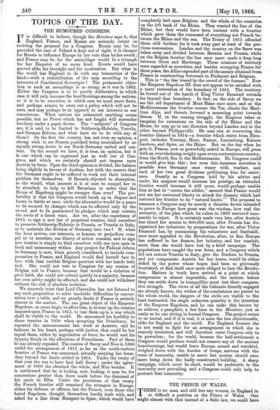TOPICS OF THE DAY.
THE RUMOURED CONGRESS.
IT is difficult to believe, though the Moniteur says it, that England, France, and Russia are seriously intent on reviving the proposal for a Congress. Russia may be, for provided the case of Poland is kept out of sight, it is cheaper for Russia to influence Europe by her vote than by her sword ; and France may be, for the assemblage would be a triumph for her Emperor of no mean kind. Events would have proved alike his foresight and his moderation. But what in the world has England to do with any transaction of the kind—with a redistribution of the map according to the interests of Continental Sovereigns ? The permanent objec- tion to such an assemblage is as strong as it was in 1863. Either the Congress is to be purely deliberative, in which case it will only increase the heartburnings among the nations, or it is to be executive, in which case we must move fleets, and perhaps armies, to carry out a policy which will not be ours, and may perhaps be as opposed to our interests as our consciences. When nations are exhausted anything seems possible, but no Power which has not fought will surrender territory under a paper decree. The "subjects" of Congress are, it is said, to be limited to Schleswig-Holstein, Venetia, and German Reform, and what have we to do with any of them On the first the country has not even an opinion, a strong wish to see Prussia punished being neutralized by an equally strong desire to see North Germany united and con- tent. On the second we have, it is true, an opinion, but it is one which can be expressed just as well out of Con- gress, and which we certainly should not impose upon Austria by force. Upon the third opinion is divided, the balance being slightly in favour of dualism, but with the reserve that the Germans ought to be suffered to work out their internal problem for themselves. If Bavaria objected to absorption, as she would, what interest is it of ours to compel her to be absorbed, to help to kill Bavarians in order that the House of Hapsburg might be stronger than ever? The pro- bability is that the Congress would break up in disgust and hurry to battle at once, while the alternative would be a peace to be secured by changes which can be effected only by the sword, and to be guaranteed by pledges which may contain the seeds of a dozen wars. Are we, after the experience of 1815, to sign a new list of perpetual treaties, bind ourselves to preserve Schleswig-Holstein to Prussia, or Venetia to Italy, or to maintain the division of Germany into two If, when the hour arrives, our interests, or honour, or prejudices com- pel us to interfere, our liberty of action remains, and to sign new treaties is simply to bind ourselves with our eyes open in fresh and unnecessary -withes. Any project for Federal reform in Germany is sure, when gravely considered, to include com- pensation to France, and England would find herself face to face with that terrible Belgian question with her hands both tied. She could not vote in Congress for any cession of Belgian soil to France, because that would be a violation of good faith, she could not submit quietly to a majority, because her own safety might be affected, and she could not withdraw without the risk of absolute isolation.
We sincerely trust that Lord Clarendon has not listened to any such proposition to solve insoluble difficulties by conver- sation over a table, and we greatly doubt if France is entirely sincere in the matter. The one great object of the Emperor Napoleon, as years begin to affect him, is to tear up the treaties imposed upon France in 1815, to tear them up in a way which shall be visible to the world. He announced his hostility to those treaties in 1850 when accepting the Presidency, he repeated the announcement last week at Auxerre, and he believes in his heart, perhaps with justice, that could he but repeal them, either by negotiation or force, he would seat his dynasty firmly in the affections of Frenchmen. Part of them he has already repealed. The cession of Savoy and Nice in 1860 undid the arrangement of 1815 as far as the south-eastern frontier of France was concerned, actually carrying her boun- dary beyond the limits settled in 1814. Under the treaty of that year she was to have had half Savoy ; under the agree- ment of 1860 she obtained the whole, and Nice besides. It is northward that he is looking now, looking, it may be, for concessions greater than those made before the dismissal of his uncle to Elba. Under the provisions of that treaty the French frontier still remained the strongest in Europe, either for defence or offence, but the French, even those who hated Napoleon, thought themselves hardly dealt with, and asked for a line from Nienport to Spire, which would have completely laid open Belgium and the whole of the countries on the left bank of the Rhine. They wanted the line of the Rhine, but they would have been content with a frontier which gave them the command of everything not French be- tween the Rhine and the sea. The Treaty of 1815 offended, them still further, for it took away part at least of the pre-. viow3 concessions. Landau and the country on the Sarre was. taken away and divided between Bavaria and Prussia, while on the Belgian frontier the line once more made a deep loop between Givet and Maubeuge. These scissions of territory were regarded as securities, and besides occupying France for three years, the Allies expended part of the money obtained front France in constructing fortresses in Piedmont and Belgium.






























 Previous page
Previous page